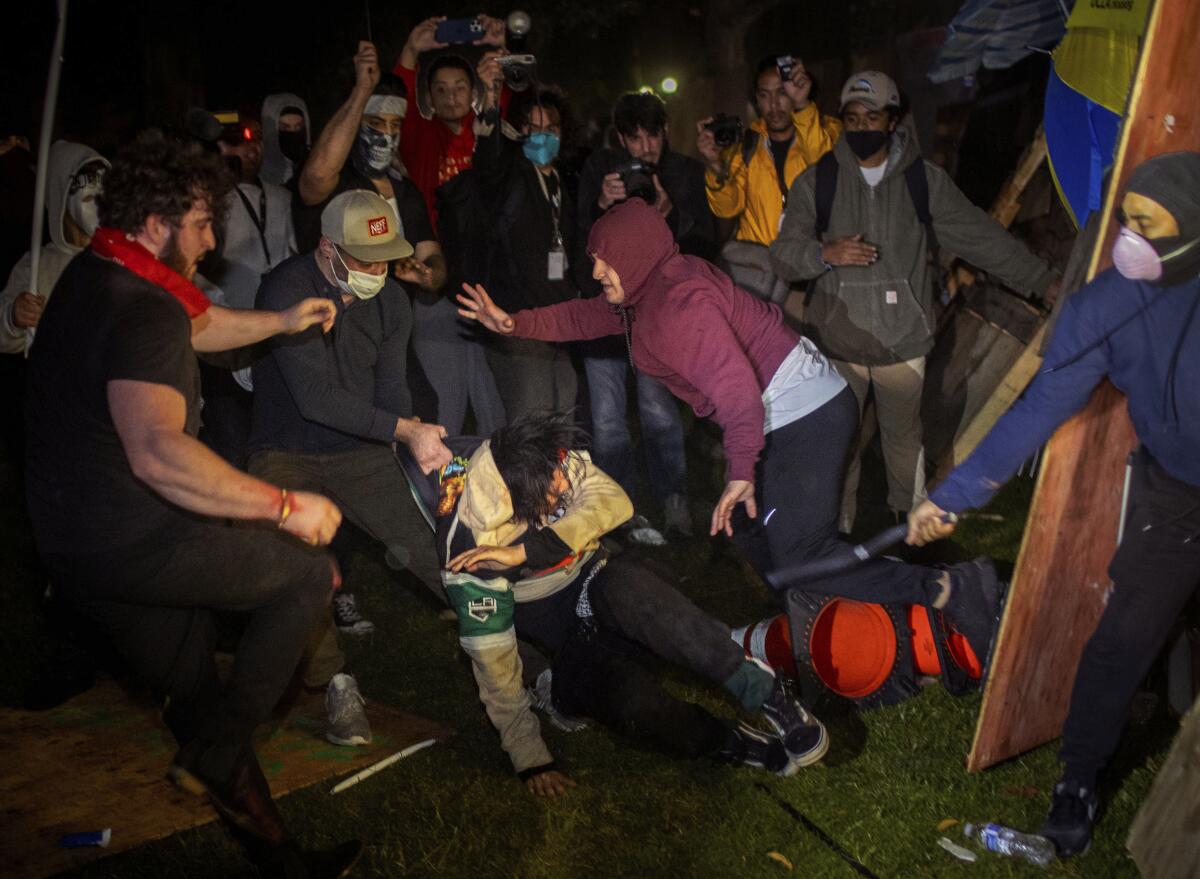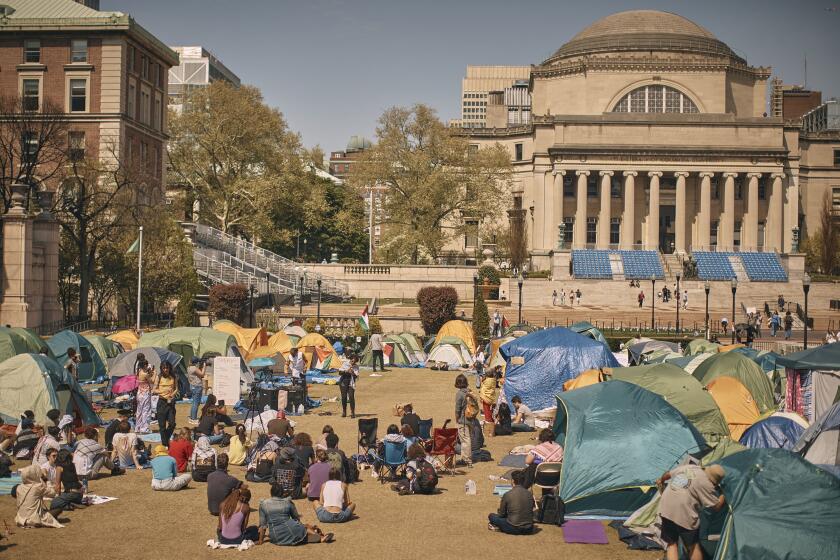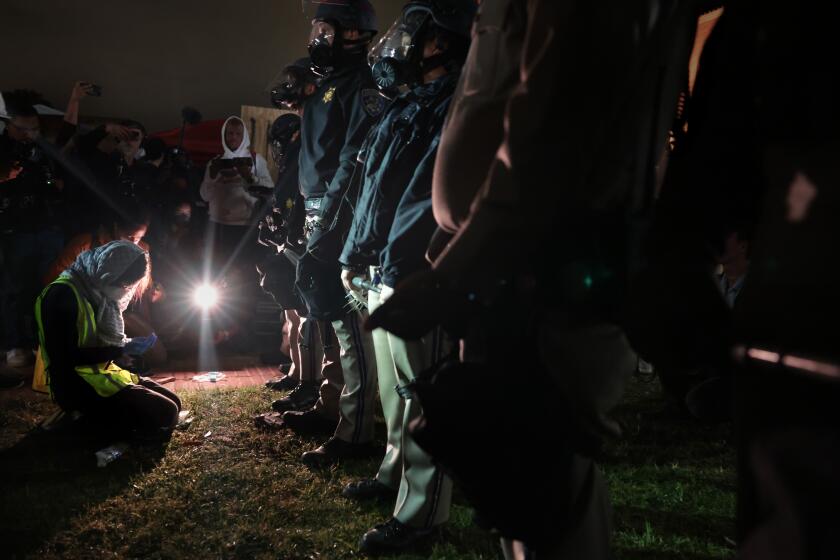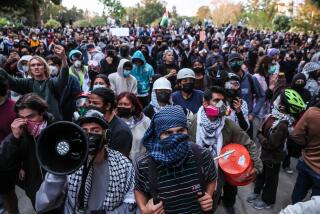Police clear pro-Palestinian demonstration at Columbia as campus protests continue nationwide

New York police in riot gear burst into a building occupied by antiwar protesters at Columbia University overnight, breaking up a demonstration that had paralyzed the school.
Tent encampments of protesters calling on universities to stop doing business with Israel or companies that support the war in Gaza have spread across campuses nationwide in a student movement unlike any other this century. The ensuing police crackdowns echoed the removal decades ago of a much larger protest movement at the school against the Vietnam War.
There have been confrontations with law enforcement and more than 1,000 arrests. In rare instances, university officials and protest leaders struck agreements to restrict the disruption to campus life and upcoming commencement ceremonies.
Late Tuesday, New York City police officers entered Columbiaâs campus after the university requested help. They cleared a tent encampment along with Hamilton Hall, where a stream of officers used a ladder to climb through a second-floor window. Protesters had seized the Ivy League school building about 20 hours earlier and vandalized it.
âAfter the University learned overnight that Hamilton Hall had been occupied, vandalized, and blockaded, we were left with no choice,â the school said in a statement. âThe decision to reach out to the NYPD was in response to the actions of the protesters, not the cause they are championing.â
At Yale, about 45 protesters were arrested and charged with misdemeanor trespassing, said Officer Christian Bruckhart, a New Haven police spokesperson.
A few dozen protesters at Columbia were arrested after shrugging off an earlier ultimatum to abandon the encampment Monday or face suspension, inspiring demonstrations on campuses elsewhere.
Fabien Lugo, a first-year accounting student who said he was not involved in the protests, said he opposed the universityâs decision to call in police.
âThis is too intense,â he said. âIt feels like more of an escalation than a de-escalation.â
Blocks away from Columbia, at the City College of New York, demonstrators were in a standoff with police outside the main gate. Video posted on social media by reporters late Tuesday showed officers forcing some people to the ground and shoving others as they cleared the street and sidewalks.
After police arrived, officers lowered a Palestinian flag from the City College flagpole and tossed it to the ground before raising an American flag.
Brown University, another Ivy League school, reached an agreement Tuesday with protesters on its Rhode Island campus. Demonstrators said they would close their encampment if administrators consider divestment from Israel in October â apparently the first time a U.S. college has agreed to protester demands to vote on divestment.
Columbia University issued an ultimatum for students to sign a form and leave a pro-Palestinian protest encampment by afternoon or face suspension.
Meanwhile, at Northern Arizona University in Flagstaff, police in riot gear closed in on an encampment late Tuesday and arrested about 20 people for trespassing. University officials warned earlier that day that students would face criminal charges if they did not disperse.
First-year student Brayden Lang watched from the sidelines. âI still know very little about this conflict,â he said. âBut the deaths of thousands is something I cannot stand for.â
Police also cleared an encampment on Wednesday morning at Tulane University in New Orleans and took down all but one tent at the University of Wisconsin in Madison, where police with shields shoved protesters, resulting in a scrum and at least a dozen arrests.
The nationwide campus protests began at Columbia in response to Israelâs offensive in Gaza after Hamas launched a deadly attack on southern Israel on Oct. 7. Militants killed about 1,200 people, most of them civilians, and took roughly 250 hostages. Vowing to stamp out Hamas, Israel has killed more than 34,000 Palestinians in the Gaza Strip, according to the Health Ministry there.
As cease-fire negotiations appeared to gain steam, it wasnât clear whether those talks would lead to an easing of protests.
Student antiwar protesters at U.S. universities vow to keep going; some universities move to close encampments after reports of antisemitic activity.
Israel and its supporters have branded the university protests as antisemitic, while Israelâs critics say it uses those allegations to silence opposition.
Some protesters have been caught on camera making antisemitic remarks and violent threats, but organizers of the protests, some of whom are Jewish, say it is a peaceful movement aimed at defending Palestinian rights and protesting the war.
Columbiaâs police action happened on the 56th anniversary of a similar move to quash the occupation of Hamilton Hall by students protesting racism and the Vietnam War.
The Police Department had said officers wouldnât enter without the college administrationâs request or an imminent emergency. Now, law enforcement will be there through May 17, when the universityâs commencement events are scheduled to end.
In a letter to senior police officials, Columbia President Nemat Shafik said the administration asked officers to remove protesters from the occupied building and a tent encampment âwith the utmost regret.â
New York Mayor Eric Adams said on MSNBCâs âMorning Joeâ that police had to move into Hamilton Hall âfor the safety of those children.â
As pro-Palestinian protests grow at California colleges and universities, counterprotesters spark clashes at UCLA.
He again blamed outside agitators for the building takeover â an issue Shafik has also raised, though neither provided specific evidence to back up the contention, which was disputed by protest organizers and participants.
Adams, a Democrat and former police captain, said that although students were among those who entered Hamilton Hall, âit was led by individuals who were not affiliated with the university.â
âThere is a movement to radicalize young people. And Iâm not going to wait until it is done to acknowledge the existence of it,â Adams said. He said that, as mayor, he would ânot allow that to happen.â
Pressed, however, about the identities of the âoutside agitatorsâ cited by the mayor, officials repeatedly declined to provide details. Police commanders talked generally about tactics demonstrators had used, such as using chains to secure doors, saying those strategies must have been taught.
Rebecca U. Weiner, the NYPDâs deputy commissioner of intelligence and counterterrorism, said that some of the people present at the campus protests were âknownâ to the department to have participated in past protests.
Adams said revealing those details would be âtoo sensitiveâ to an ongoing law enforcement investigation.
The NYPDâs deputy commissioner for public information, Tarik Sheppard, said 40 to 50 people were arrested at Hamilton Hall and there were no injuries.
Encampments and protests took place at UC Berkeley and Cal Poly Humboldt, and plans were shaping up for more pro-Palestinian protests at California colleges and universities.
Combined, about 300 people were arrested at Columbia University and City College in police crackdowns, Adams said.
Protesters first set up a tent encampment at Columbia almost two weeks ago. The school sent in police to clear the tents the next day, arresting more than 100 people, only for the students to return.
Negotiations between the protesters and the college came to a standstill in recent days, and the school set a deadline for the activists to abandon the tent encampment Monday afternoon or be suspended.
Instead, protesters defied the ultimatum and took over Hamilton Hall early Tuesday, carrying in furniture and metal barricades.
Ilana Lewkovitch, a self-described âleftist Zionistâ student at Columbia, said itâs been hard to concentrate on school for weeks. Her exams have been disrupted with chants of âsay it loud, say it clear, we want Zionists out of here.â
Lewkovitch, who is Jewish, said she wished the current pro-Palestinian protests were more open to people like her who criticize Israelâs war policies but believe there should be an Israeli state.
Dazio, Swope, Offenhartz and Frederick write for the Associated Press. Offenhartz and Frederick reported from New York, Dazio and Swope from Los Angeles. AP journalists around the country contributed to this report, including Cedar Attanasio, Jonathan Mattise, Colleen Long, Karen Matthews, Jim Vertuno, Hannah Schoenbaum, Sarah Brumfield, Christopher Weber, Carolyn Thompson, Dave Collins, Makiya Seminera, Philip Marcelo, Corey Williams, Felicia Fonseca and Kathy McCormack.
More to Read
Sign up for Essential California
The most important California stories and recommendations in your inbox every morning.
You may occasionally receive promotional content from the Los Angeles Times.















